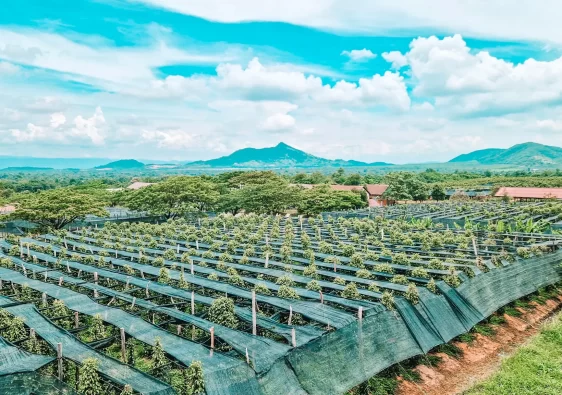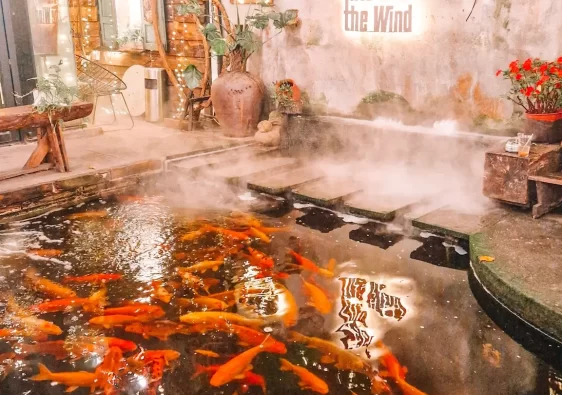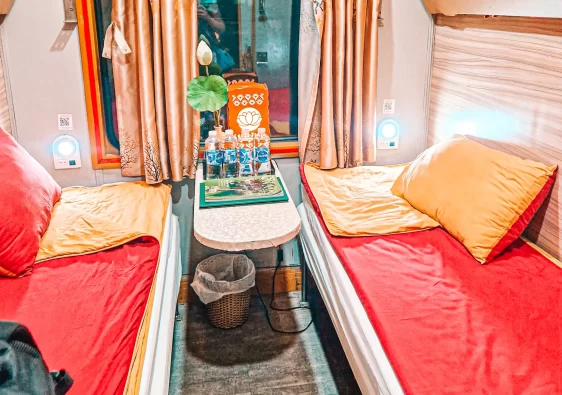Planning a 4 day tour of the Mekong Delta but want to skip the tour bus? You’re not alone. Most travelers experience this lush, river-laced region on a tightly packed group trip from Ho Chi Minh City—but that doesn’t mean you have to. Independent travel in the Delta is possible, and it’s far more rewarding. The challenge? Finding reliable, up-to-date information on how to plan it yourself. Between vague transport details and blog posts focused on package tours, planning a solo visit can feel overwhelming. It might even seem like visiting the Mekong Delta independently is more trouble than it’s worth.
Just so you know, this post contains affiliate links. If you book a tour, hotel, or buy something through one of these links, I may earn a small commission—at no extra cost to you. It helps me keep this blog running and full of travel tips. Thanks for the support!
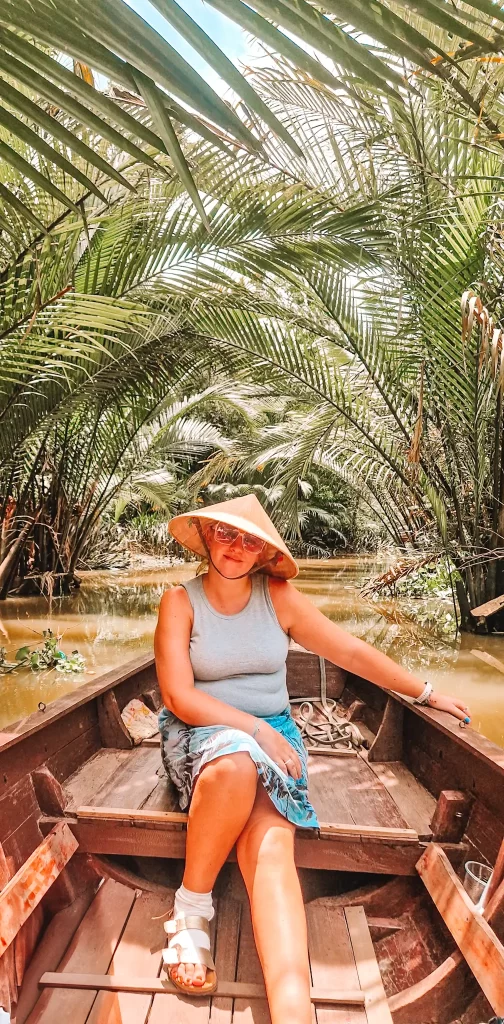
Why should you visit the Mekong Delta by yourself?
Before heading south in May 2025, I struggled to find reliable information, and came very close to joining a group tour. But after navigating quiet backroads through coconut groves, visiting the local coffee boat in Can Tho’s floating market, and cycling alongside rice paddies in Ben Tre, I can tell you: it’s absolutely worth visiting the Mekong Delta independently. That’s not to say that guided tours don’t have their place – you’ll need one for the Mekong Delta Floating Market. But I prefer to travel independently in between.
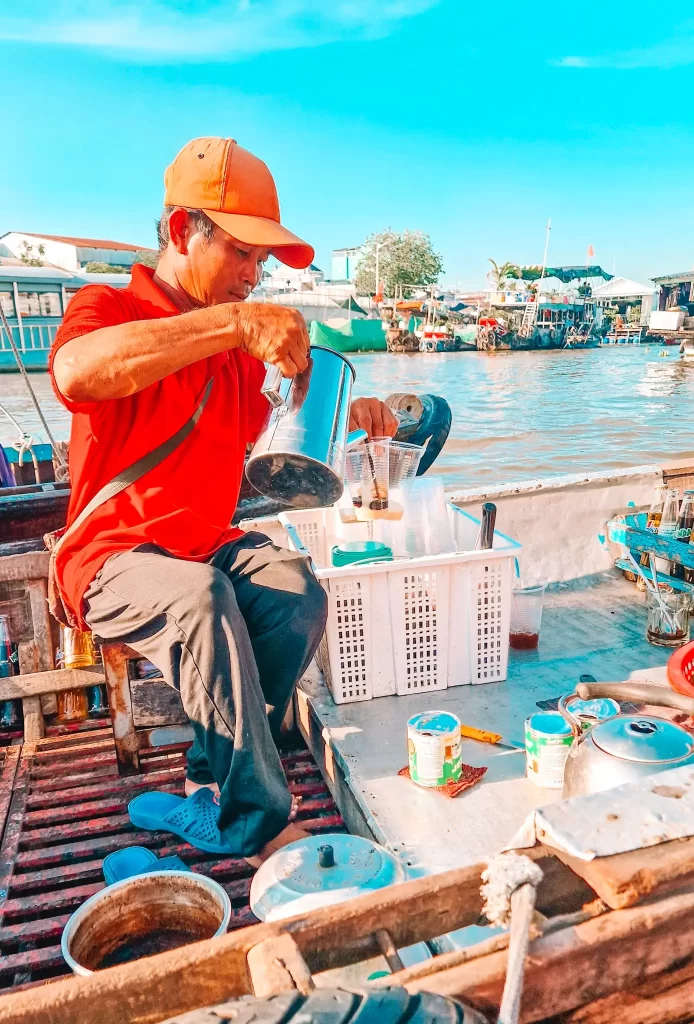
This 4 day/3 night Mekong Delta itinerary is designed for curious travelers who prefer to move at their own pace—without missing the region’s most rewarding spots. Whether you’re craving peaceful scenery, local food, or a deeper look into everyday river life, this guide will show you how to experience the Delta with flexibility, comfort, and a little soul. To visit the Mekong Delta by yourself, I’ve focused on two of the region’s most captivating areas: Can Tho, famous for its colorful floating market, and Ben Tre, known for its peaceful coconut-lined canals and authentic river village charm.
The importance of the Mekong Delta in Vietnam
The Mekong is the third longest river in Asia, crossing China, Myanmar, Laos, Thailand, Cambodia and Vietnam, where it meets the sea. No trip to Southeast Asia is complete without a trip along the Mekong at some point in its long journey – I’ve also toured the Mekong on the famous Tonle Sap Lake in Siem Reap and in Luang Prabang and the beautiful 4000 Islands in Laos.
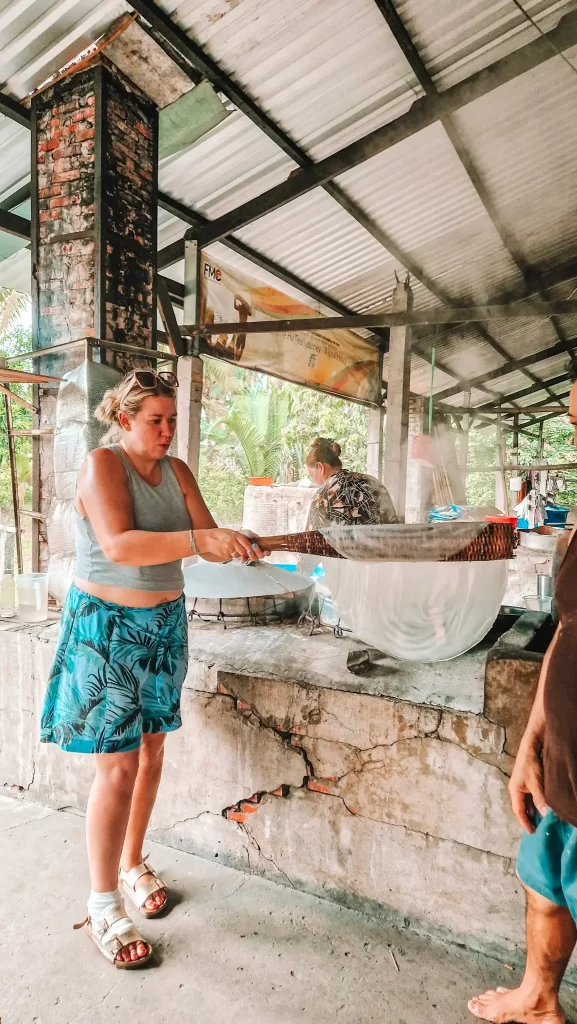
The Mekong Delta is often referred to as the “rice bowl” of Vietnam, as over 50% of the country’s rice production takes place in the Delta. With a huge population of around 18 million people, producing around one third of Vietnam’s GDP (despite being far less industrialised than other parts of the country), understanding the Mekong is central to understanding Vietnam.

It’s a vibrant region crisscrossed with rivers, canals, and lush rice paddies. Life flows along the water, and traditional culture remains deeply rooted in daily life. I visited back in 2010, including a trip to the Floating Market in Can Tho, and much of that culture remains intact today. The breathless development that other parts of Vietnam have experienced just hasn’t hit this area in the same way. A 4 day/3 night trip to the Mekong Delta gives you the chance to see a more traditional Vietnam, and explore the lush greenery the country is so famous for.
Mekong Delta Itinerary Day 1: Arrival in Can Tho
Day 1 is purely your arrival day. Most people visiting the Mekong Delta independently will arrive from Ho Chi Minh City, so I recommend getting an afternoon bus and arriving in time for dinner. There’s relatively little to do in Can Tho itself, so get an early night and prepare for the Floating Market in the morning.
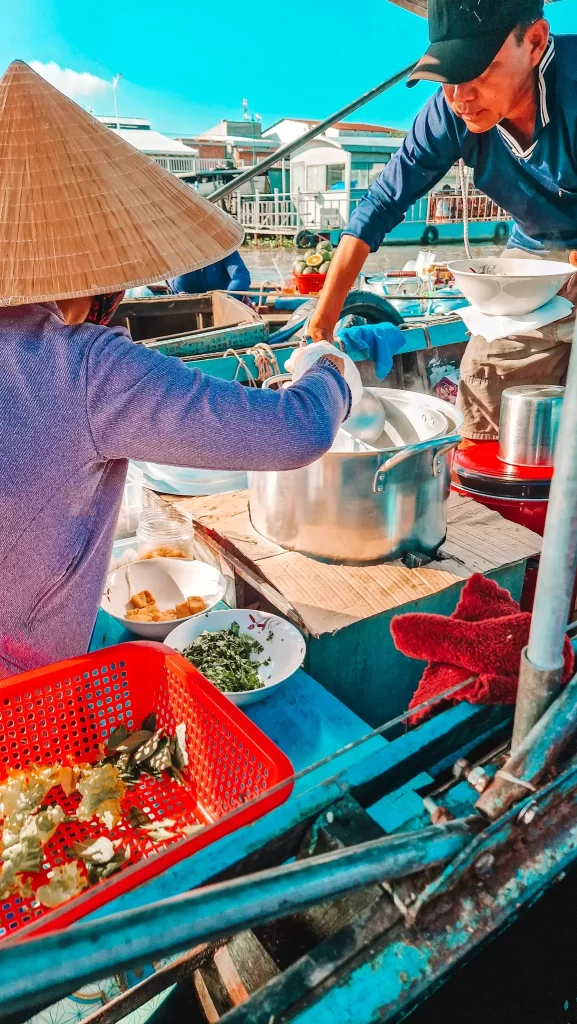
If you’re arriving from another part of Vietnam (I flew from Da Nang), Can Tho is also a good starting point as it has the region’s main airport.
Whether you arrive by bus or plane, Grab is common in the city and it will be easy to get a taxi (or bike, if you travel light) to your hotel.
Mekong Delta Itinerary Day 2: An early start for Can Tho’s famous floating market
Can Tho’s Floating Market is such an important part of life in Vietnam that it has been recognised as a national intangible cultural heritage by Vietnam’s Ministry of Culture, Sports and Tourism. While sources are vague, it’s thought to have started in the early 20th century and quickly became an important wholesale market in an area where the primary form of transport was by river.
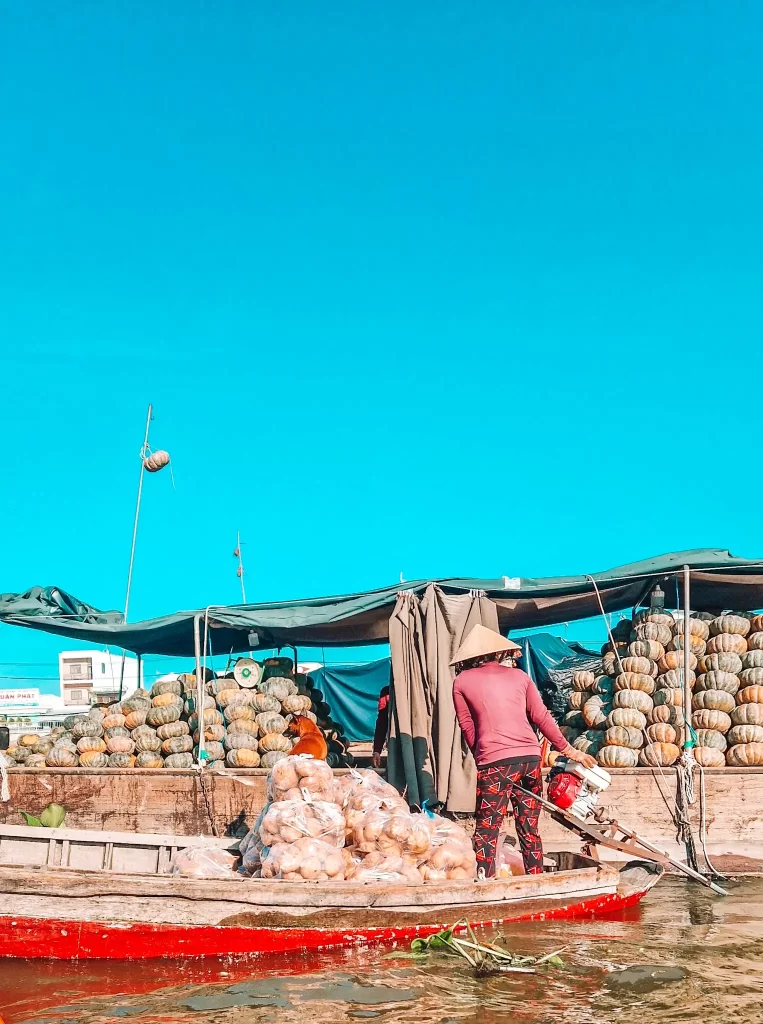
This is one of those times that a guided tour is not just useful but necessary – you will need a boat to see the market. It starts early, at around 5am, and many tours will take you out for sunrise. However, I recommend this tour on Get Your Guide that is run by local graduates. They prefer to leave a bit later (don’t we all), as the market is now busiest between 7-9am. The market is more or less over by 10am, so the early start is definitely necessary.
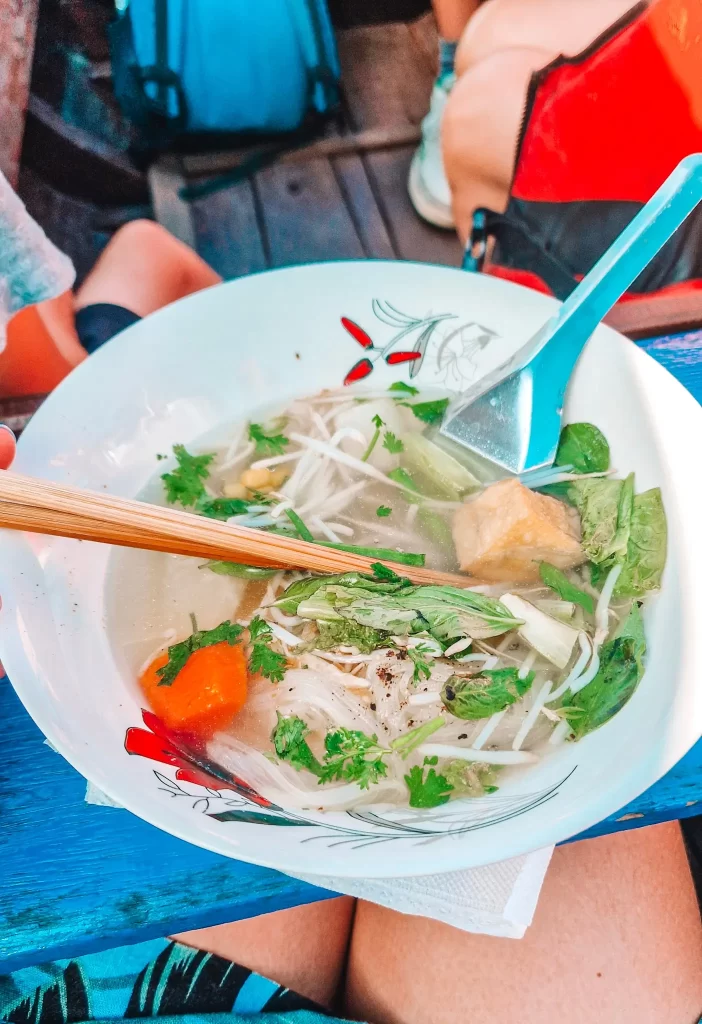
This tour was hands down one of the best I’ve done in 10 months of travelling. We were a small group, and we cruised peacefully down the river, past bigger boats bulging with tourists. Our guides knew the area so well, and they took us to a small coffee boat and breakfast boat primarily used by locals. This meant that not only did we enjoy a unique breakfast on our tiny boat, but we also avoided the heaving and touristy floating restaurants. We also got to visit a family boat and understand the way that local families continue to live on the Mekong.
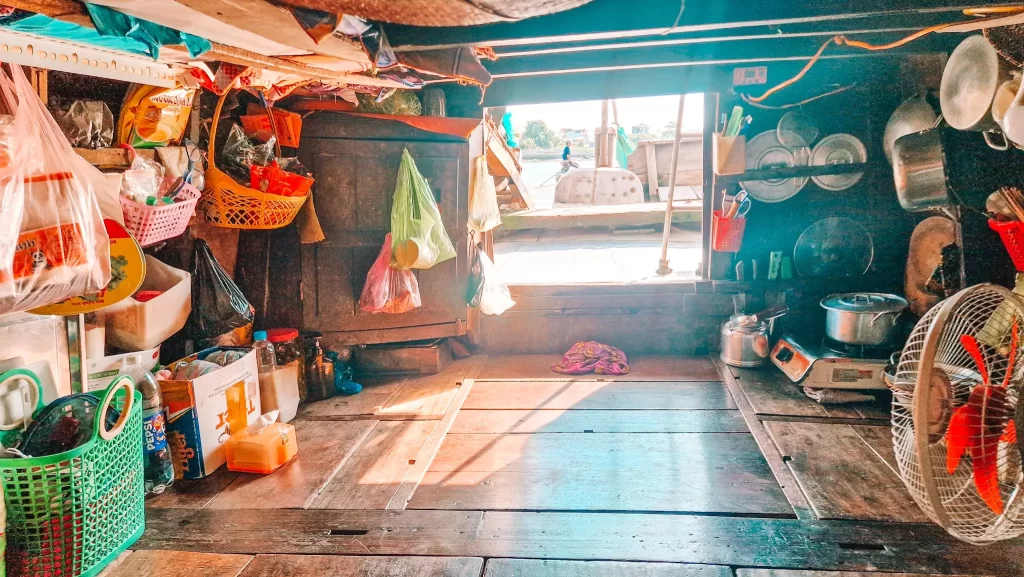
After visiting the floating market, we enjoyed a short trip to a noodle factory, a cacao farm and then a quiet glide down some side canals for some stunning photos. I have rarely been on a tour where I’ve learned so much so quickly, and come away feeling like I’ve really understood a local culture.
Tips for getting from Can Tho to Ben Tre
Journey time: approximately 3 hours
Your tour will finish around lunchtime, which gives you time to get to the bus station for your transfer to Ben Tre. The buses aren’t available to book online. You’ll need to ask your hotel for help, or buy a ticket on arrival at the bus station. My bus departed at 2pm, and there also seemed to be a bus at 1pm (although I didn’t take this bus so I can’t fully confirm).
This is definitely the most complicated part of visiting the Mekong Delta independently, and it didn’t go well for me. My bus didn’t actually stop in Ben Tre—it dropped me on the side of the road well outside the city. To avoid this, I recommend booking through your hotel in Can Tho, or asking your hotel in Ben Tre for advice in advance. Ask them to show you the right stopping point in Ben Tre, and make sure to communicate this clearly to the driver before boarding. Then keep an eye on Google Maps as you enter the city to make sure you don’t sail past your bus stop.
The company I used was a far cry from Vietnam’s famous VIP buses, but it had aircon and wasn’t too crowded.
Mekong Delta Itinerary Day 3: Exploring the area around Ben Tre
With the floating market behind you, it’s time to venture deeper into the Delta’s quieter corners. Most hotels in Ben Tre are in the more rural areas on the outskirts of the city, and there’s a reason for this – the area is stunning. I recommend spending a full day exploring this area, and you have a few options for how to do that:
- Explore the Mekong Delta independently by bicycle: many hotels in the area will offer bikes either for free or for rent. Take time to explore the quiet backroads and ride along lush canals and rice paddies.
- Take a cycling tour: this offers the same beauty as exploring independently, but will offer a more structured experience, usually taking you to see local industries.
- Take a boat tour: a much less active way to see the local area, you can spend time in a small boat floating peacefully down offshoots of the Mekong. Any organised boat tour will also likely include similar visits to local industries.
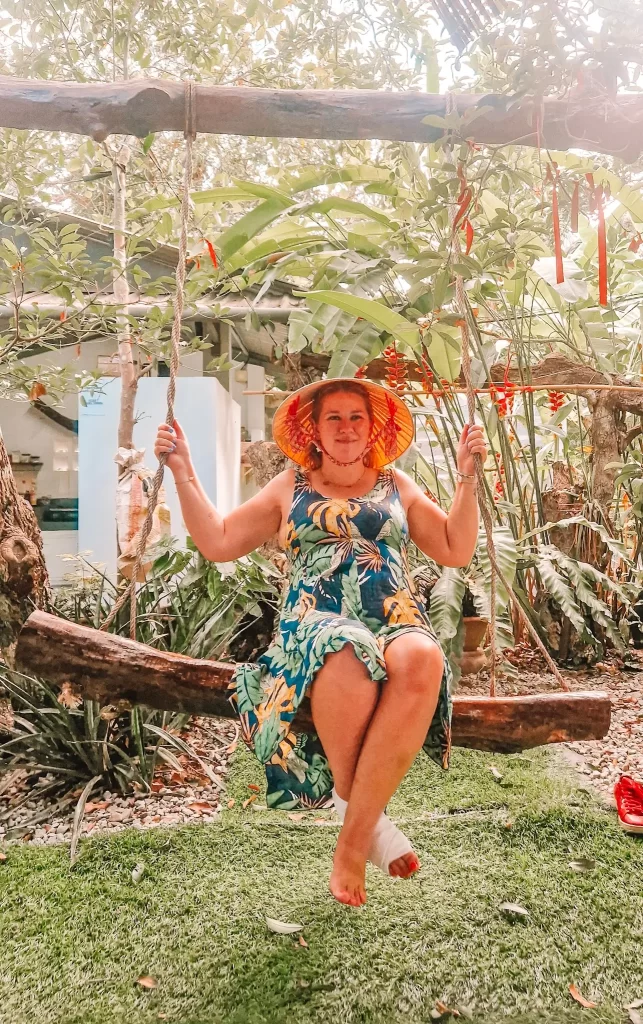
It’s hard to find tours in Ben Tre other than those run by your hotel, as the area is relatively remote. Having looked online, I opted to join a cycling and boat tour with my hotel (although as I had an injured foot I got taken on a motorbike like a passenger princess), and I thoroughly enjoyed it.
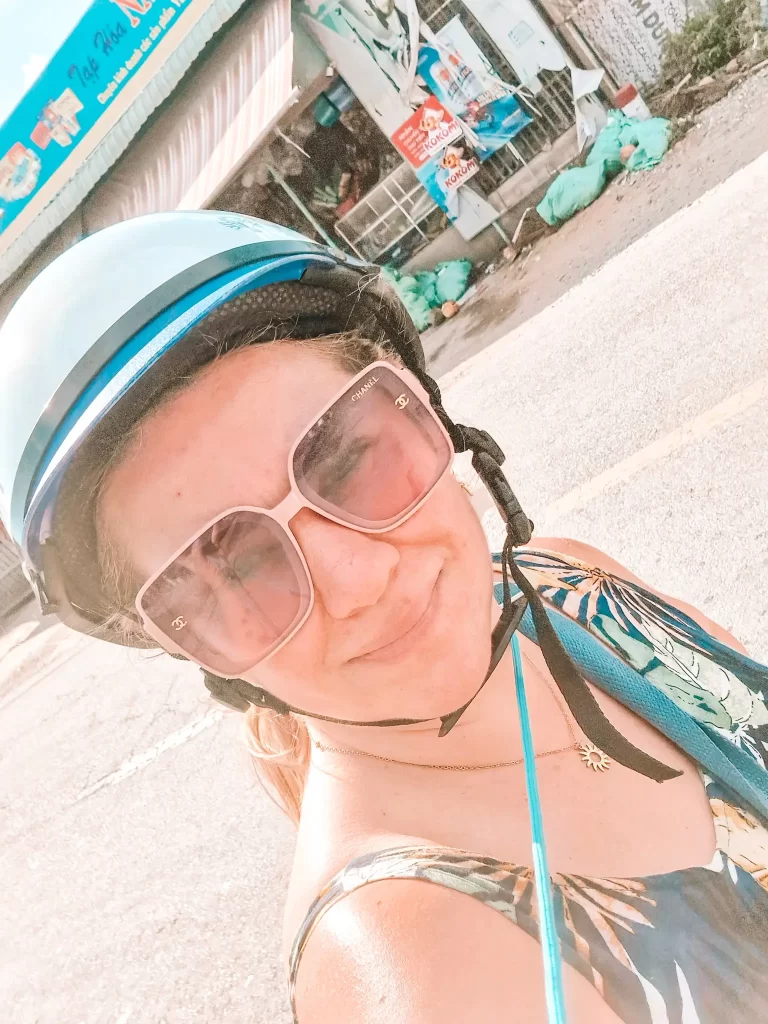
After the initial cycle, we visited a fruit farm and a small fish farm before peacefully cruising down the Mekong at sunset. The tour was expensive compared to others I’ve taken in Vietnam, but a lot of research (from the other guests as well as me) showed that it was a normal price in Ben Tre. Despite the price, I did really enjoy the trip and got to see things I wouldn’t have been able to independently.

Note: it can be fiercely hot in the Mekong Delta. Some members of my tour really struggled with the heat while cycling. Bear this in mind when planning your Mekong Delta itinerary.
Mekong Delta Itinerary Day 4: Back to Ho Chi Minh City
Journey time: 2 hours
After soaking up the riverside tranquility, it’s time to return to city life. I recommend spending a further morning in Ben Tre, either exploring or relaxing, before heading back to Ho Chi Minh City. I opted for relaxation – my hotel had a beautiful pool, and I spent the morning enjoying a sunbed and a good book before heading back to the chaos of the big city.
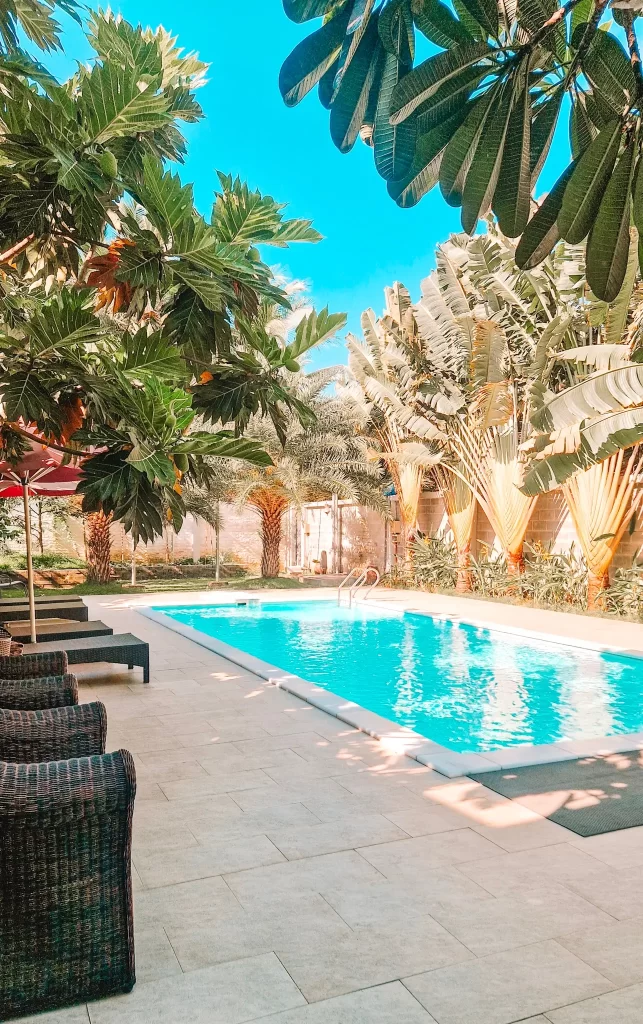
Buses from Ben Tre to Ho Chi Minh City are much easier to find and more frequent than those between Can Tho and Ben Tre.
There is a bus available to book online via 12GoAsia, or you can book a local bus via your hotel (as I did), which might pick you up along the way nearer to your hotel. The bus will take you to the centre of the city. Check which bus station your company uses in advance, although as ever a Grab to your hotel is easy and cheap in Ho Chi Minh City.
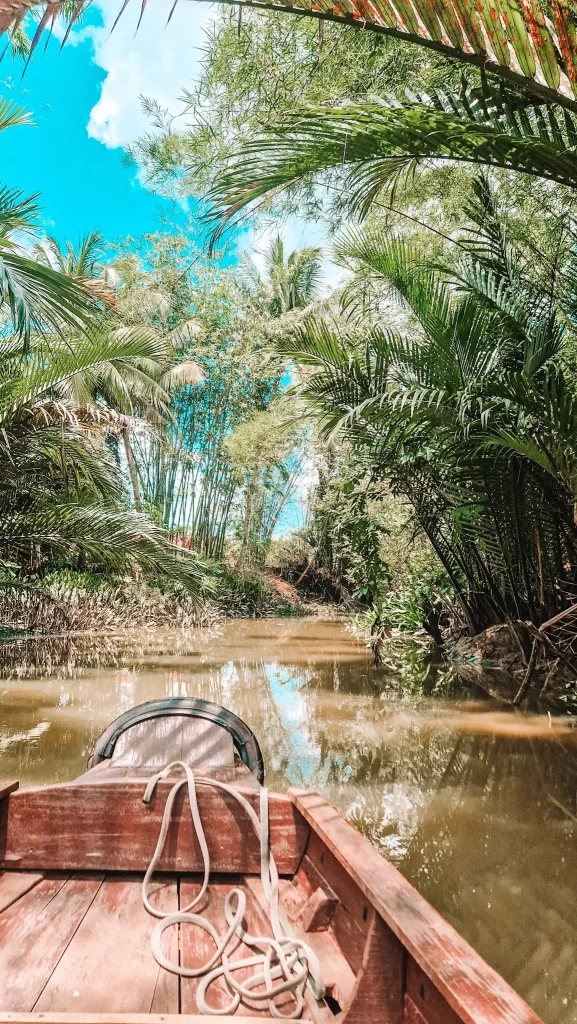
Tips for a Perfect 3-Night Mekong Delta Itinerary
Is it safe to travel independently in the Mekong Delta?
Yes, the Mekong Delta is generally safe for independent travelers. Use common precautions like avoiding travel at night, keeping valuables secure, and using trusted transport providers. English is not widely spoken in rural areas, so having translation apps or basic Vietnamese phrases can help. If you are exploring independently by bike, download the Google Map for the relevant area to your phone in case you lose signal.
Is the Mekong Delta suitable for solo female travelers?
Yes. Many solo female travelers report positive experiences. The area is friendly and welcoming, but as always, take standard safety precautions, especially when travelling at night or taking remote boat rides.
What is the best time of year to visit the Mekong Delta?
The best time to visit is during the dry season, from December to April, when weather is more predictable and river travel is smoother.
May to October is the rainy season, which brings lush greenery but can also cause occasional flooding or transport delays. I visited in May 2025 and it was fiercely hot.
Can I get by in the Mekong Delta without speaking Vietnamese?
Yes, many locals in the tourist and expat areas speak some English. Apps like Google Translate are also very helpful. A few polite Vietnamese phrases go a long way though!
What to Pack
The Mekong Delta is often hot and humid. Pack light clothes that will help you stay cool. Consider whether you want to be covered up while you’re in the sun e.g. long-sleeved shirts.
There are mosquitos in the Mekong Delta. Make sure to pack and use mosquito repellent. This is also easily available in Vietnam.
ATMs are easily accessible in Can Tho and in Ben Tre city, but not easily accessible in most of the hotels in the Ben Tre area. Many places in the Mekong Delta will rely on cash, so make sure to take some out in Ho Chi Minh City or Can Tho.
Booking guided tours vs. visiting the Mekong Delta independently
As you’ll see above, while I visited independently, I also took two guided tours on my Mekong Delta trip. This raises the question of whether it’s better to just do a guided tour for the full trip. For me, this isn’t the right option:
With fully guided tours, you’re not in charge of your own time. You have to follow a set schedule and there’s relatively little option to have down time. I really loved that even on this short Mekong Delta itinerary I spent two quiet mornings resting by a beautiful pool – something that’s unlikely on a guided tour.
I was able to research Can Tho floating market tours, and pick one that didn’t start at 5am! The extra hour of sleep was invaluable for me.
You are with a group of people at all times. As someone who solo travels because they like their own space, this isn’t right for me. I loved being with people on the two small group tours I did, and then I loved leaving them when it was finished!
You’re not in charge of choosing your own hotels, and it’s harder to customise your budget. For example, I chose to stay in a beautiful treat hotel in Ben Tre, but budgeted hard in Can Tho because I found a highly rated budget option. A fully guided itinerary will either pick luxury or budget, rather than letting you design your own choices.
Fully guided tours are rarely a good price for solo travellers unless you’re willing to share a room with a stranger (which I don’t like). The single supplement often makes the price disproportionate.
However, there are definitely benefits of doing a fully guided tour of the Mekong Delta:
Your time will be used very efficiently. You won’t spend time waiting for buses (as I did at Can Tho bus station) and you’ll be taken directly to every destination.
You’ll have a dedicated guide at all times, and if you do your research into a good tour company, they should be a fountain of knowledge about life in the Mekong Delta.
Your tour provider will vet your hotels and you’ll be assured of good quality.
If, having read this guide to visiting the Mekong Delta independently, you’ve decided that a fully guided tour is best for you, I recommend doing your research into the best companies. Pay a little extra for a small group tour, as in my experience this makes a huge difference.
Do I need to book Mekong Delta tours in advance?
Not always. Many small-group tours (like the floating market trip in Can Tho) can be booked the day before through your hotel. However, during peak tourist seasons or for niche experiences, it’s safer to book 1–2 weeks in advance.
Also, if you are a solo traveller, waiting until nearer to your trip can bring benefits. I wanted to book the Get Your Guide trip of the Can Tho Floating Market early, but it was expensive as no one else had yet booked onto the trip. Nearer to the departure date, it was cheaper as there were already others taking the tour.
Can I visit the Mekong Delta as a day trip from Ho Chi Minh City?
Yes, but only for limited destinations like My Tho or Ben Tre. A day trip won’t allow enough time to visit places like Can Tho or see the floating markets. For a more immersive experience, plan an overnight stay.
Are buses in the Mekong Delta reliable for tourists?
Buses are widely used by locals, but routes can be confusing and stops aren’t always clearly marked. It’s best to book through your hotel, ask for help with translation, and monitor your journey on Google Maps to avoid missing your stop.
My hotel in Ben Tre booked me onto the local bus, and took me to flag down the bus when it was coming. It was a bit later than they expected (about 10 minutes later), so they were able to call the company for me to make sure we hadn’t missed it. This made the process much smoother.
Where to stay in the Mekong Delta
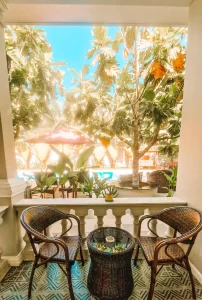
I stayed in two very different hotels on my Mekong Delta itinerary, but highly recommend them both:
Chill Guesthouse Can Tho: this very budget guesthouse in Can Tho is run by a Viet-Belgian couple and has an exceptionally high rating for a reason. While rooms are simple, they are spotless, have everything you need and are comfy. The guesthouse is a little out of the main city (although still very close), and as a result I felt like I was living in the real Can Tho.
La Villa de Coco Ben Tre: probably the nicest hotel I’ve stayed in through my 10 months of travel. With only four rooms, this gorgeous hotel is able to give each guest individual attention. The pool is beautiful, the rooms are spacious and well-designed, and the breakfast buffet is amazing.

Exploring the Mekong Delta on your own terms isn’t just possible—it’s one of the most rewarding ways to experience it. While most travelers stick to guided tours, crafting your own 3 day tour of the Mekong Delta lets you move slower, connect deeper, and experience the region beyond the surface. With the right planning, a touch of flexibility, and this itinerary in hand, you’ll discover that independent travel here isn’t just doable—it’s unforgettable.

